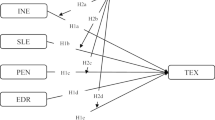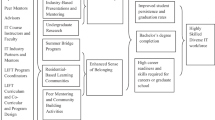Abstract
This qualitative study involves tracking the process by which Asian STEM (Science, Technology, Engineering, and Math) graduate students encounter graduate studies as they build professional identities. We derived data from interviews and observations of 27 Asian international STEM graduate students at various stages of their graduate careers at a large research university located in the United States. The following research question guided this investigation: What are key influencers of STEM students’ professional identity? We conducted this study using a qualitative grounded theory approach, and we developed a central professional identity development model from emergent themes that related to the central phenomenon. Findings indicated Asian international STEM graduate students’ previous work experiences, disciplinary skills acquisition, English proficiency, and socialization with peers and faculty advisors were significant influential factors to their professional identity development. These influencers interacted to both positively facilitate and negatively hinder the student’s progress toward professional identity development. Together, this work suggests academic socialization is a crucial factor for student success and professional identity development.

Similar content being viewed by others
References
Bakhtin, M. M. (1953). The problem of speech genres and other late essays. Austin: University of Texas Press.
Bandura, A. (1989). Human agency in social cognitive theory. American Psychologist, 44(9), 1175.
Baxter, L. A. (2004). Relationships as dialogues. Personal Relationships, 11(1), 1–22.
Berkenkotter, C., Huckin, T., & Ackerman, J. (1988). Convention, conversations, and the writer: Case study of a student in a rhetoric Ph.D. program. Research in the Teaching of English, 22(1), 9–44.
Carter, M. (2007). Ways of knowing, doing, and writing in the disciplines. College composition and Communication, 58(3), 385–418.
Chang, Y. J., & Kanno, Y. (2010). NNES doctoral students in English-speaking academe: The nexus between language and discipline. Applied Linguistics, 31(5), 671–692.
Charmaz, K., & Mitchell, R. G. (2001). Grounded theory in ethnography. In P. Atkinson, A. Coffey, S. Delamont, J. Lofland, & L. H. Lofland (Eds.), Handbook of ethnography. London: Sage Publications.
Choi, T. (2006). Asian International Students’ Academic Adjustment in a US Graduate School and Stanton-Salazar’s Framework. Pacific-Asian Education Journal, 18(2), 51–68.
Creswell, J. W., & Brown, M. L. (1992). How chairpersons enhance faculty research: A grounded theory study. Review of Higher Education, 16(1), 41–62.
Dean, K. L., & Jolly, J. P. (2012). Student identity, disengagement, and learning. Academy of Management Learning & Education, 11(2), 228–243.
Ducheny, K., Alletzhauser, H. L., Crandell, D., & Schneider, T. R. (1997). Graduate student professional development. Professional Psychology: Research and Practice, 28(1), 87–94.
Gazzola, N., De Stefano, J., Audet, C., & Theriault, A. (2011). Professional identity among counseling psychology doctoral students: A qualitative investigation. Counseling Psychology Quarterly, 24(4), 257–275.
Gee, J. P. (2001). Reading as situated language: A sociocognitive perspective. Journal of Adolescent & Adult Literacy, 44(8), 714–725.
Healey, A. C., & Hays, D. G. (2012). A discriminant analysis of gender and counselor professional identity development. Journal of Counseling & Development, 90(1), 55–62.
Institute of International Education. (2016). Open Doors Report on International Educational Exchange. Retrieved from http://www.iie.org/opendoors
Jorgensen, K. M., & Keller, H. D. (2008). the contribution of communities of practice to human resources development: Learning as negotiating identity. Advances in Developing Human Resources, 10(4), 525–540.
Kaplan, A., & Flum, H. (2012). Identity formation in educational settings: A critical focus for education in the 21st century. Contemporary Educational Psychology, 37(3), 171–175.
Kim, S. (2006). Academic oral communication needs of East Asian international graduate students in non-science and non-engineering fields. English for Specific Purposes, 25(4), 479–489.
Ligorio, M. B. (2010). Dialogical relationship between identity and learning. Culture and Psychology, 16(1), 93–107.
Litzler, E., Lange, S. E., & Brainard, S. G. (2005). Climate for graduate students in science and STEM departments. Proceedings of the 2005 American Society for STEM Education Annual Conference & Exposition. Portland, OR.
Miller, D. (1992). The generic strategy trap. Journal of Business Strategy, 13(1), 37–41.
Moje, E. B., & Lewis, C. (2007). Examining opportunities to learn literacy: The role of critical sociocultural literacy research. Reframing sociocultural research on literacy: Identity, agency, and power (pp. 15–48). Mahwah, NJ: Erlbaum
Moje, E. B., & Luke, A. (2009). Literacy and identity: Examining the metaphors in history and contemporary research. Reading Research Quarterly, 44(4), 415–437.
Moss, J. M., Gibson, D. M., & Dollarhide, C. T. (2014). Professional identity development: a grounded theory of transformational tasks of counselors. Journal of counseling & development, 3(2), 92–98.
Park, J. J., Choe, N. H., Schallert, D. L., & Forbis, A. K. (2017). The chemical engineering research laboratory as context for graduate students’ training: The role of lab structure and cultural climate in collaborative work. Learning, Culture and Social Interaction, 13, 113–122. https://doi.org/10.1016/j.lcsi.2017.04.001.
Pratt, M. G., Rockmann, K. W., & Kaufmann, J. B. (2006). Constructing professional identity: The role of work and identity learning cycles in the customization of identity among medical residents. Academy of Management Journal, 49(2), 235–262.
Ravichandran, S., Kretovics, M., Kirby, K., & Ghosh, A. (2017). Strategies to address English language writing challenges faced by international graduate students in the US. Journal of International Students, 7(3), 3–7.
Rønnestad, M. H., & Skovholt, T. M. (2003). The journey of the counselor and therapist: Research findings and perspectives on professional development. Journal of Career Development, 30(1), 5–44.
Schallert, D. L., Song, K., & The D-Team. (2016). Shifts in positioning, trajectories in thought communities, and “wobbly” identities in computer-mediated classroom discussions. Paper presented at the annual meeting of the National Reading Conference/Literacy Research Association, Albuquerque, New Mexico.
Slay, H. S., & Smith, D. A. (2011). Professional identity construction: Using narrative to understand the negotiation of professional and stigmatized cultural identities. Human Relations, 64(1), 85–107.
Strauss, A., & Corbin, J. (1998). Basics of qualitative research: Techniques and procedures for developing grounded theory. SAGE Publications.
Street, B. V. (2009). “Hidden” features of academic paper writing. Philadelphia: University of Pennsylvania Press.
Sutherland, L., Howard, S., & Markauskaite, L. (2010). Professional identity creation: Examining the development of beginning pre-service teachers’ understanding of their work as teachers. Teaching and Teacher Education, 26(3), 455–465.
Wenger, E. (1998). Communities of practice: Learning, meaning, and identity. Cambridge: Cambridge University Press.
Woodruff, A. L., & Schallert, D. L. (2008). Studying to play, playing to study: Nine college student-athletes’ motivational sense of self. Contemporary Educational Psychology, 33(1), 34–57.
Author information
Authors and Affiliations
Corresponding author
Ethics declarations
Conflict of interest
The authors declare that they have no conflict of interest. There was no funding for the project.
Appendix A
Appendix A
Sample Semi-Structured Interview Questions
In line with qualitative methodology (e.g., Strauss and Corbin 1998; Creswell and Brown 1992), questions should begin with general queries, so as not to prime interviewees’ responses by asking specific questions. However, the following sample questions were used as a guide to explore the different elements and phases of professional identity development of educational psychology graduate students.
General Identity Questions
How do you introduce yourself to others?
Can you tell me about who you are?
What were you doing before joining this graduate program?
What other roles do you have beside being an international graduate student?
Can you tell me about your graduate school life?
What milestones of graduate school have you completed so far?
What obstacles did you have to overcome in graduate school in America?
How do you think those obstacles influenced you?
Professional Identity
Can you tell me about your professional identity?
Can you define what professional identity is in your field?
What does it mean for you to be a professional in the field?
What experience so far has contributed to your professional identity and why?
What experiences have resonated with you as a professional in the field and why?
What kind of professional skills do you think you need to acquire?
Do you personally know any professional individuals in the field?
Future Plans and Professional Identity
What is your short term academic/career plan?
What is your long-term plan?
How do you envision yourself in your field?
What kind of career would you like to have after graduation?
Rights and permissions
About this article
Cite this article
Park, J.J., Chuang, YC. & Hald, E.S. Identifying Key Influencers of Professional Identity Development of Asian International STEM Graduate Students in the United States. Asia-Pacific Edu Res 27, 145–154 (2018). https://doi.org/10.1007/s40299-018-0373-6
Published:
Issue Date:
DOI: https://doi.org/10.1007/s40299-018-0373-6




